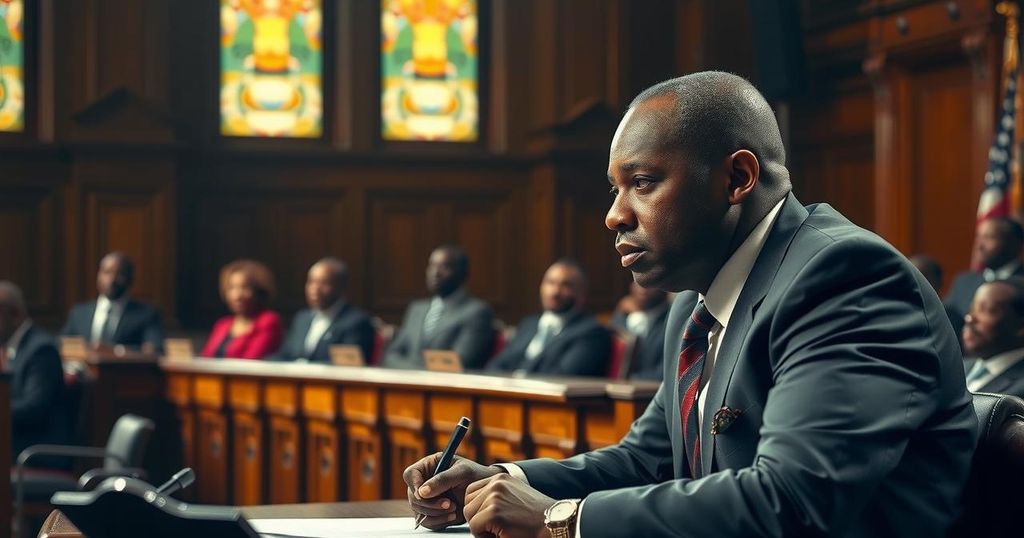Ugandan lawyer Kalali Steven has filed a lawsuit against the DRC at the East African Court of Justice, alleging human rights violations in Makala Central Prison, including overcrowding, abuse, and sexual violence against inmates. Following a deadly jailbreak attempt, Kalali’s suit seeks to hold the DRC accountable, requesting compensation for victims and improved prison conditions. The case could significantly impact human rights practices across the East African region.
Ugandan lawyer Kalali Steven has initiated legal proceedings against the Democratic Republic of Congo (DRC) at the East African Court of Justice, alleging significant human rights violations occurring within the Makala Central Prison in Kinshasa. The suit claims that the DRC government is responsible for severe overcrowding, instances of physical abuse, and sexual violence against female inmates in the facility, which was originally designed to accommodate 1,500 detainees yet was reported to be holding approximately 14,000 at the time of the incidents. Kalali maintains that such inhumane conditions violate the East African Community (EAC) Treaty as well as various international human rights laws. This case, submitted to the First Instance Division located in Arusha, Tanzania, is poised to hold the DRC accountable as a Partner State of the EAC. The legal move follows a tragic jailbreak attempt in early September 2024 that resulted in numerous fatalities attributed to violent responses from security forces. Kalali claims that DRC forces employed live ammunition against unarmed inmates, leading to over 129 deaths—a grave violation of the fundamental right to life as enshrined in the EAC Treaty. Kalali further emphasizes the appalling allegations of sexual violence, citing reports from the United Nations Population Fund (UNFPA) indicating that “269 out of 348 female prisoners reportedly experienced sexual abuse.” He argues that the DRC’s failure to provide safety for female inmates constitutes a breach of international commitments regarding women’s rights. Additionally, Kalali highlights the restrictions placed on legal and civil support for detainees following the jailbreak attempt, asserting that unauthorized access to legal representation violates Article 8(1)(c) of the EAC Treaty, which emphasizes the importance of justice and support for inmates. Kalali also voices concerns regarding minors being detained alongside adults in Makala Prison, asserting this practice not only endangers young detainees but also contravenes international norms and the United Nations Convention on the Rights of the Child. In his lawsuit, Kalali requests that the court declare the DRC in violation of the EAC Treaty, mandate compensation for affected inmates, and compel the DRC to rectify the conditions within its prisons. He also seeks an injunction to prevent further abuses from occurring in the future. This lawsuit is significant in the context of East Africa, as it raises vital questions regarding the accountability of Partner States to uphold human rights standards within the EAC. Kalali has urged the court to enforce regional human rights obligations, stating that “the EAC must ensure the protection of its citizens’ rights.” As the legal proceedings unfold, human rights advocates throughout East Africa are keenly observing the potential ramifications for prisoner rights and the degree of state accountability within the EAC.
The legal action taken by Kalali Steven stems from a broader concern over human rights violations within prisons in the East African region, particularly regarding the treatment of inmates and the conditions in which they are held. The Makala Central Prison serves as a significant case study due to its reported overcrowding, physical abuse of inmates, and allegations of sexual violence. Such conditions are a violation of both the East African Community (EAC) Treaty and international human rights laws, which emphasize the protection of individual rights and humane treatment of detainees. The lawsuit underscores the necessity for accountability in the management of prisons and the importance of safeguarding human rights for all individuals, including vulnerable populations such as women and minors. The unfortunate events surrounding the recent jailbreak and the subsequent loss of life have intensified scrutiny on the DRC’s prison practices, highlighting the urgent need for reform.
In conclusion, the lawsuit filed by Ugandan lawyer Kalali Steven against the DRC at the East African Court of Justice brings critical attention to the human rights violations occurring within Makala Central Prison. By addressing issues such as overcrowding, physical and sexual abuse, and the lack of legal support for inmates, the case highlights essential shortcomings in the DRC’s adherence to both regional and international human rights standards. As the court case progresses, it has the potential to significantly impact prisoner rights and state accountability within the East African Community, setting a precedent for future governance surrounding human rights in prisons.
Original Source: allafrica.com






